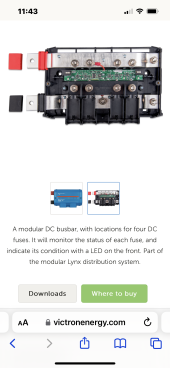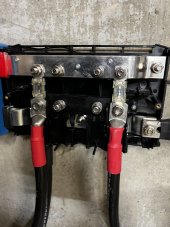Where fromI've used these before for some projects. They're 1/4" thick and will handle 1000 amps. I buy the untinned versions to save money and to make sure they're solid copper, then I clean and nickel electroplate them myself with vinegar.
I'm sure someone out there has one with 24 studs...
You are using an out of date browser. It may not display this or other websites correctly.
You should upgrade or use an alternative browser.
You should upgrade or use an alternative browser.
Anybody sell custom bus bars?
- Thread starter AlaskanNoob
- Start date
Yes, I've seem the pictures and the mod. I love the money saving idea. It doesn't mean its safe or smart to fuse batteries there.Have you looked at the Victron Distributor? Exactly the same everything except the lights. Identical
I would 100% pick a "home made" battery bank busbar with the batteries fused as close to the positive terminal as possible, over putting fuses in the power in and running unfused wires from the batteries.
Now if you battery has DC rated breakers with a high AIC maybe that's enough, but then why also fuse?
Unless those batteries have DC rated breakers (didn't check brand), I would personally consider your setup to have some risk.
6
629658
Guest
I wouldn’t argue that they aren’t for every situation and I’m sure there are other commercial bus bars out there but if you want the most bang for your buck Victron Lynx is a thing of beauty and I can sleep at night knowing I’m not going to flame out. My original point was I do not think you can DIY a quality set of buss bars for the price of a Victron so why would you? If it’s a special application maybe but this DC storage we are putting in can be deadly in the wrong hands. If I cheaped out and burned up myself and or my family then it was not worth any savings.Fused *inside* the lynx? Seems risky to me. IMHO the reason the power in doesn't normally take fuses is that those fuses belong at the current source. I love the hack of turning a power in into a distributor (minus the fancy lights as people put it), but I wouldn't fuse batteries there personally.
Regardless of DIY or buying someone else's, theres no way around that the Lynx system forces you to design around it, everything goes in and out of the bottom (or top if it's all upside down). I don't believe that's the best choice for compact/clean (and safe) runs of the wires in all cases.
The Good Package
New Member
Where from
About ~$55
6
629658
Guest
Each Battery 100% DC rated breakers fuses are sitting on the bus bar hard to get closer than that. Remember fuses protect the wire. Also T class between inverter and buss and finally DC rated breaker in the inverter.Yes, I've seem the pictures and the mod. I love the money saving idea. It doesn't mean its safe or smart to fuse batteries there.
I would 100% pick a "home made" battery bank busbar with the batteries fused as close to the positive terminal as possible, over putting fuses in the power in and running unfused wires from the batteries.
Now if you battery has DC rated breakers with a high AIC maybe that's enough, but then why also fuse?
Unless those batteries have DC rated breakers (didn't check brand), I would personally consider your setup to have some risk.
Victron fuses identical to the distributor.
6
629658
Guest
Yes it’s solid copper. Drilled like it was condition “full hard” pure copper. I’ve been machining everything from aluminum to zirconium for over forty years so yeah, I can tell. It was actually flat within.003” across the width which is a lot better by comparison than the little buss bars that come with cells that are convex or concave and distorted from the oval punched holes, not optimal for small welded terminals. I was going to fly cut them but there’s no need.Have you tested the quality of the copper? Amazon has a lot of faked items (and due to how they do inventory even things "sold by Samsung" (for example) get mixed in with fakes/low quality. I've has ROMEX sold by a name brand from amazon be counterfeit (CCA, rather than solid coper).
Also does chemical tinning act the same way electrically?
This is what I was working on today. They are collet sections to hold thin wall stainless 14” tubing to prep ends for welding. Tank farm for spaceX project. By your demeanor, you assume others must be a knuckle dragger. Good evening sir.

rodrick
Free energy enthusiast
Not a big fan of something that runs most of time over 50 volts dc and high amps that uses mega fuses, on a 24 or 12 ok, not something I would use on a 48 but if you are willing to take that risk because of some phobia of diy bus bars or lack of knowledge to build something better, that’s your call, me a 48 volt bus that uses class t fuses would be my minimum standardYea no fuses huh?
Not sure I understand this argument. Positive and negative terminals are close in just about all the equipment out there. I’d say they’re actually further away in the Victron Power In/Distributors.I certainly wouldn't use it to connect unfused battery or battery banks (even with the hack to add fuses) since positive and negative MUST enter close to eachother.
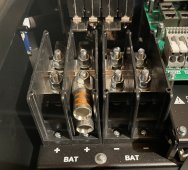
There is a very small but vocal community here that says all batteries should have a Class T fuse at the positive terminal.Not a big fan of something that runs most of time over 50 volts dc and high amps that uses mega fuses, on a 24 or 12 ok, not something I would use on a 48 but if you are willing to take that risk because of some phobia of diy bus bars or lack of knowledge to build something better, that’s your call, me a 48 volt bus that uses class t fuses would be my minimum standard
To be on the safe side, I have come pretty close to that.
But look at nearly all the other set-ups. Will, et al.
The fuse only enters the picture for the last run to the inverters from the battery banks.
What’s that blue thingy?
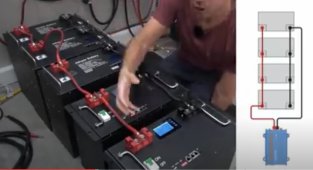
Last edited:
The Good Package
New Member
There is a very small but vocal community here that says all batteries should have a Class T fuse at the positive terminal.
To be on the safe side, I have come pretty close to that.
But look at nearly all the other set-ups. Will, et al.
The fuse only enters the picture for the last run to the inverters from the battery banks.
I use Buss 150a breakers between each battery and the pos bus bar to make it easy for maintenance. You really only need T class in front of (expensive) loads.
150 amp surface-mount circuit breakers. 6-48 VDC.I use Buss 150a breakers between each battery and the pos bus bar to make it easy for maintenance. You really only need T class in front of (expensive) loads.
Sean Very North
New Member
I wouldn't trust those.I use Buss 150a breakers between each battery and the pos bus bar to make it easy for maintenance. You really only need T class in front of (expensive) loads.
You call them Buss .... that listing name drops Bussmann, who are a very reputable, long time established, quality manufacturer - I would expect their involvement with that breaker is exactly zero.
AlaskanNoob
Solar Enthusiast
- Joined
- Feb 20, 2021
- Messages
- 915
Midnight Solar 2000 Amp battery combiner box and drill extra holes as needed?
I'll look into that, thanks.
6
629658
Guest
50 ways to skin the cat. Hero or Zero really. I’ll stick with a quality engineered use specific product every time. It’s your house and your family not mine thank goodness. Wonder why we aren’t having the same conversation about the AC components??? Crap might as well hob knob your own breaker panels. That’s certainly doable. How about knife switches? They should be easy to make. Hang a few of those on the side of the house. While you’re at it how about some PVC pipe racking for your arrays would save a bundle. Crap let’s all make our own transfer switches those babies are crazy expensive and I’m sure they would be WAY better than anything from a manufacturer. And finally I say class T fuses everywhere.
Buss seems to be pretty adamant when confronted about the 48 volt limit. To be real, most 48 volt systems (lead or lithium) really only sees 48V when totally depleted. I’ve used two Buss breakers for a year now and haven’t seen issues with multiple disconnects. That being said I don’t know what’s going on inside the breaker. They are being replaced this weekend with another breaker that has much more voltage capacity and a huge “arc chute”. Food for thought, If you have ever done stick welding, just see how long an arc you can draw out and that’s typically only about 35 volts DC.150 amp surface-mount circuit breakers. 6-48 VDC.
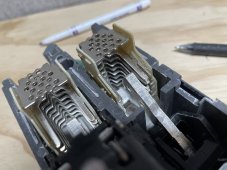
rodrick
Free energy enthusiast
I think your on the right track I would question the suitabilities of some of these 48 volt products on systems running 50+ volts ultimately your the final engineer / quality assurance, unless your buying a turn key system installed by a licensed electrician approved by manufacturer to install there equipment your responsible for the systemBuss seems to be pretty adamant when confronted about the 48 volt limit. To be real, most 48 volt systems (lead or lithium) really only sees 48V when totally depleted. I’ve used two Buss breakers for a year now and haven’t seen issues with multiple disconnects. That being said I don’t know what’s going on inside the breaker. They are being replaced this weekend with another breaker that has much more voltage capacity and a huge “arc chute”. Food for thought, If you have ever done stick welding, just see how long an arc you can draw out and that’s typically only about 35 volts DC. View attachment 142407
just because you spend a lot of money on something doesn’t make it safe, your knowledge and tradecraft is what makes it safe
The Good Package
New Member
I wouldn't trust those.
You call them Buss .... that listing name drops Bussmann, who are a very reputable, long time established, quality manufacturer - I would expect their involvement with that breaker is exactly zero.
You're paranoid. Eaton purchased Cooper in 2012 which owned the Bussman brand. The exact breaker is on the Eaton website, so there is no need for baseless claims.
I understand the risk of using a 12v or 24v rated breaker / switch with a much higher voltage, but a 48v rated one is perfectly fine to use with 55v and I've been doing it for years with zero issues.
I get it, there are plenty of people with a low risk tolerance who feel safe overbuilding with oversized conductors, name brand bus bars, top of the line fuses, pretty blue Victron boxes on the wall, etc. Nothing wrong with that if it makes you feel safe or you have the cash to burn and want to flex. It makes sense to pony up for *some* components, but I see a lot of people wasting their money.
After doing this for a while and testing many components well beyond their stated limits, my risk tolerance is very high and the tens of thousands of dollars I've saved over the years has certainly been put to good use.
AlaskanNoob
Solar Enthusiast
- Joined
- Feb 20, 2021
- Messages
- 915
You're paranoid. Eaton purchased Cooper in 2012 which owned the Bussman brand. The exact breaker is on the Eaton website, so there is no need for baseless claims.
I understand the risk of using a 12v or 24v rated breaker / switch with a much higher voltage, but a 48v rated one is perfectly fine to use with 55v and I've been doing it for years with zero issues.
I get it, there are plenty of people with a low risk tolerance who feel safe overbuilding with oversized conductors, name brand bus bars, top of the line fuses, pretty blue Victron boxes on the wall, etc. Nothing wrong with that if it makes you feel safe or you have the cash to burn and want to flex. It makes sense to pony up for *some* components, but I see a lot of people wasting their money.
After doing this for a while and testing many components well beyond their stated limits, my risk tolerance is very high and the tens of thousands of dollars I've saved over the years has certainly been put to good use.
Personally, my risk tolerance is very low. Because I don't know anything, don't have years testing components (I am not signing up to be a guinea pig testing components anyway) and given that "sorry, my test failed" isn't going to reassure the hundreds or thousands of people who will be tragically affected should I catch something on fire in the middle of hundreds of thousands of acres of forest.
If I have to pay extra to be ultra safe, I will gladly do so. When I want to be risky, I'll ride my Onewheel. Not when setting up my solar that will affect my family and on a bad day could affect many others.
Sean Very North
New Member
Great, but it's a fake ....You're paranoid. Eaton purchased Cooper in 2012 which owned the Bussman brand. The exact breaker is on the Eaton website, so there is no need for baseless claims.
I understand the risk of using a 12v or 24v rated breaker / switch with a much higher voltage, but a 48v rated one is perfectly fine to use with 55v and I've been doing it for years with zero issues.
I get it, there are plenty of people with a low risk tolerance who feel safe overbuilding with oversized conductors, name brand bus bars, top of the line fuses, pretty blue Victron boxes on the wall, etc. Nothing wrong with that if it makes you feel safe or you have the cash to burn and want to flex. It makes sense to pony up for *some* components, but I see a lot of people wasting their money.
After doing this for a while and testing many components well beyond their stated limits, my risk tolerance is very high and the tens of thousands of dollars I've saved over the years has certainly been put to good use.
Spot the difference, there's one significant clue
Last edited:
Similar threads
- Replies
- 7
- Views
- 644
- Replies
- 19
- Views
- 695
- Replies
- 5
- Views
- 242



